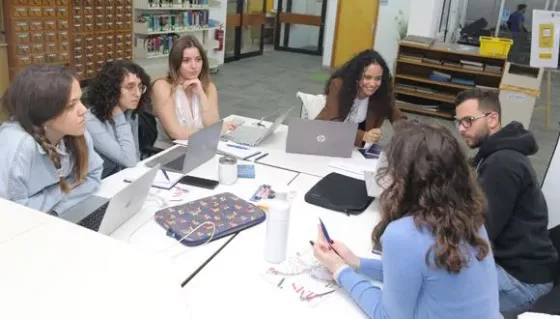
Tel Aviv University’s First MedTech Hackathon Sets a High Bar
200 students from six different disciplines find practical solutions to burning challenges in Israeli medicine.
TAU’s first competition for medical innovation ended last weekend (January 11-13) with spectacular results. The TAU MedTech Hackathon, organized by four entrepreneurial students from Tel Aviv University’s faculties of Medicine and Engineering, included 200 students who participated alongside 120 mentors and 30 judges from Israeli medicine and hi-tech. They shared the common goal of finding solutions for today’s burning medical problems.
Burning Challenges from Israel’s Medical Industry
TAU students from Medicine, Engineering, Computer Science, Bioinformatics, Neuroscience, and Sofaer Global MBA (the flagship global MBA program of the Coller School of Management) worked together in 34 interdisciplinary teams for over 40 hours to come up with practical solutions to critical issues as defined by selected Israeli organizations and hospitals.
Among the problems: finding a technological solution for early detection of peripartum depression (depression occurring during pregnancy and/or after childbirth); providing remote healthcare to ease the burden on hospitals and individuals who are physically challenged; inventing a new and safe device for brain water drainage in cases of hydrocephalus (a life threatening condition in children), and more.
The participants were not left to their own devices: each team was assigned two mentors, one from the medical world and another from the technological world, each leader in their field. In addition, the participants could join lectures and TED-style talks by industry experts.
Among the 200 participants were 30 international students, eight of them from Sofaer Global MBA. “The hackathon was an amazing experience which allowed our students to help their teams with the business side of the process and implement the knowledge they already gained through their studies into this real life experience. Impact entrepreneurship is the kind of entrepreneurship that we are encouraging and supporting at Sofaer,” said Jackie Goren, Head of the Program and one of the mentors at the hackathon.
Student Initiative
The students who launched the ambitious initiative were Tom Zukerman, Yael Lieber and Orr Erlich – all third-year medical students, and Ilan Peerutin, a third-year dual B.sc Biomedical Engineering, Biology and Neuroscience student.
Together, the four recruited support from international tech and biomedical engineering giants, as well as hospitals and health care funds. Noteworthy sponsors included: The Massachusetts Institute of Technology, AWS, Meuhedet, Sackler Faculty of Medicine, TAU’s Entrepreneurship Center, Teva, Ichilov Tech, Novartis, Startup Nation Central, Philips and the Sagol Center for Regenerative Medicine.
Tel Aviv University encourages entrepreneurial activities for and by its students, and Prof. Karen Avraham, TAU’s Dean of Medicine, supported the students throughout the process: “This was an incredible initiative, and it came entirely from the students. They asked me if the Faculty of Medicine would support the project, and I immediately agreed (…) This hackathon is particularly thrilling because it is not a given that students would dedicate their time and make the effort required to mobilize so many stakeholders to come up with solutions to save people’s lives and health,” she said.
And the Winners Are…
Making the Operating Room Safer
The first prize went to team “OReye” from the Clalit Health Services’ general surgery challenge. Most aspects of patient safety in surgeries today are handled solely by the operating team. OReye utilizes cutting-edge computer vision technology to alleviate some of this responsibility, allowing the team to focus solely on the procedure. OReye’s mission is to improve patient safety in the operating room and reduce stress for surgical teams, making it a valuable tool in the operating room. Their project stood out for its originality, feasibility, and potential impact.
The winning team will be flying to compete in the renowned Massachusetts Institute of Technology (MIT) medical hackathon competition “MIT Grand Hack,” scheduled for April 2023.
The team will also receive an AION Labs and Sanara Ventures accelerator package, which includes personal mentoring hours with experts, office space and professional tools to help develop their winning idea into a commercial startup.
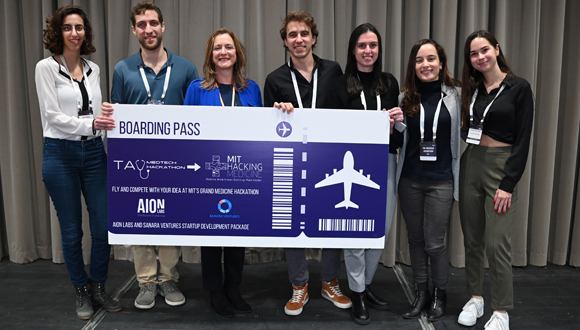
The winning team and Prof. Karen Avraham (from left to right): Adi Sarig, Aviv Ziv, Prof. Karen Avraham, Idan Hezler, Eden Elbaz, Raz Naveh and Daphne Cavanaugh
Early Detection of Peripartum Depression
The runner-ups were the “Mommies,” who competed in the women’s health challenge from the Briah Foundation. The team created a community-based wellness app for the early diagnose and treatment of peripartum depression. “It is a true delight to create something for women,” says team member Juliana Gordon from the Sofaer MBA Program, and adds “This is just the beginning. Hopefully we will be able to impact millions of lives, benefitting society.”
The team will receive ten mentoring sessions with experts from Weccelerate and the Israeli Leumit Health Services.
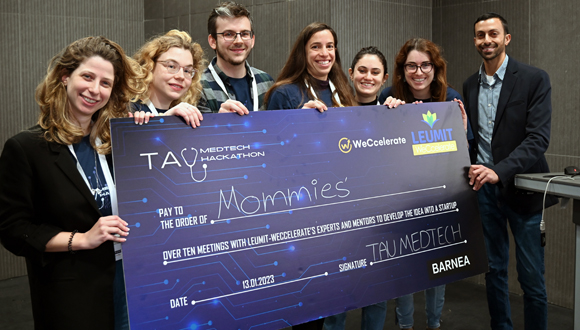
Team “Mommies” with Alon Pinhas from Weccelerate (from left to right): Juliana Gordon, Victoria Koval, Assaf Gadish, Mirit Halfon, Tal Beit Halevi, Shani Zach and Alon Pinhas (Weccelerate)
Personalized Treatment Plans for Breast Reduction
Team “ABC3D” competed in the Tel Aviv Sourasky Medical Center Ichilov’s plastic surgery challenge. They developed a service that uses 3D models to create personalized treatment plans for breast reduction surgery. This enables advanced prediction and visualization ahead of surgery.
The team was awarded an entrance ticket to the JumpTAU accelerator program at TAU’s Entrepreneurship Center.
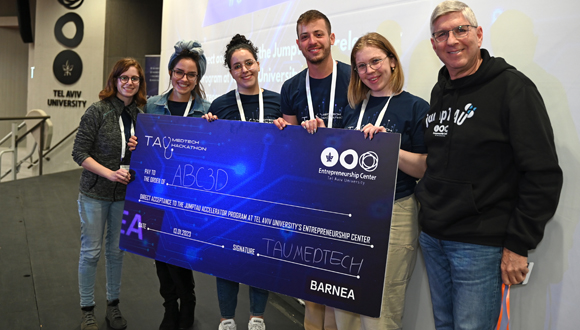
Team “ABC3D” with Yair Sakov, Head of TAU Entrepreneur Center (from left to right): Savion Cohen, Sarah Tannenbaum, Alaa Masarwa, Ido Shapira, Lydia Sokolovski and Yair Sakov (TAU Entrepreneur Center)
In addition, all the winning teams will receive legal advice, courtesy of leading Israeli commercial law firm Barnea Jaffa Lande.
“Prizes for such hackathons are usually monetary,” notes organizer Tom Zuckerman. “However, it was important to us that the winners receive tools and assistance to develop the skillsets needed to advance their initiatives.”
The Joy of the Process
How do the organizers summarize the event? The hackathon exceeded all their expectations: When we started this project, we didn’t imagine that so many people would believe in our vision. Those 40 hours were incredible; 200 talented and motivated students, accompanied by professionals and super-experienced mentors, and an extraordinary panel of judges. Seeing the results was fantastic, but following the process was an absolute joy.”
“We are already looking forward to next year’s hackathon, where we will continue to push the boundaries of medical innovation and positively impact the healthcare industry. In addition, we will be organizing other events during the year, and you’re all welcome to follow us to stay up to date!”
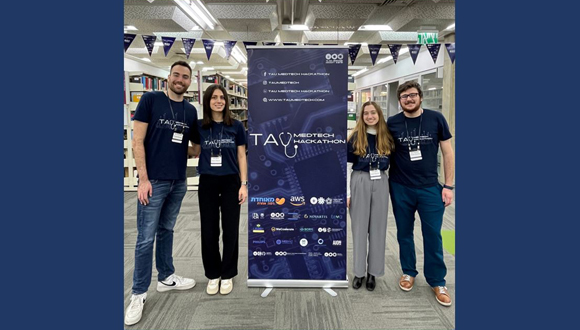
Tired but happy. TAU MEDTech organizers (from left to right) Tom Zuckerman, Orr Erlich, Yael Lieber and Ilan Peerutin
Related posts


Tel Aviv University Shatters Limits with Self-Repairing Glass







